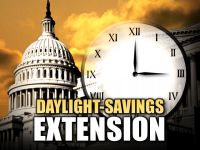
I don't know about you, but last month when the new Energy Policy passed I didn't realize that it included a provision to extend daylight saving time. In discussing it this morning in my carpool, we wondered whether it really does save enrgy. Here's some info about that.
The Change
The Energy Policy Act of 2005 amends the Uniform Time Act of 1966 by changing the start and end dates of daylight saving time starting in 2007. Clocks will be set ahead one hour on the second Sunday of March instead of the current first Sunday of April. Clocks will be set back one hour on the first Sunday in November, rather than the last Sunday of October. This will affect accuracy of electronic clocks that had pre-programmed dates for adjusting to daylight saving time. The date for the end of daylight savings time has the effect of increasing evening light on Halloween (October 31). The first Sunday in November sometimes occurs as little as two days before election day.
From Wikipedia (Energy Policy Act of 2005)
Energy savings
Starting March 11, 2007, daylight saving time will be extended another four to five weeks… Proponents claimed that the extension would save "the equivalent of" 10,000 barrels of oil per day, but this figure was based on U.S. Department of Energy information from the 1970s, the accuracy and relevance of which the DoE no longer stands by. There is very little recent research on what the actual positive effects, if any, might be. [3]
From Wikipedia (Daylight saving time)
The state of California's energy commission, however, studied the effects of daylight saving time on energy costs during California's 2001 energy crisis… overall electricity use would only decline about one half of a percent. You're basically shifting noncritical energy use to later in the day," Chandler said… "I don't know how it might work in states that don't have the same kind of weather-driven [usage] peaks as California."
From National Geographic News
Studies done by the U.S. Department of Transportation show that we trim the entire country's electricity usage by about one percent EACH DAY with Daylight Saving Time.
Daylight Saving Time "makes" the sun "set" one hour later and therefore reduces the period between sunset and bedtime by one hour. This means that less electricity would be used for lighting and appliances late in the day. We also use less electricity because we are home fewer hours during the "longer" days of spring and summer…
Daylight Saving Time also saves a small amount of energy in the morning when we rise. Studies show that 70 percent of all Americans rise prior to 7 a.m. during the work week. During the summer months, sunrise is very early in the morning, so most people will wake after the sun rises…
From The National Institute of Science and Technology
History of DST
Daylight saving time was reinstated in the United States on February 9, 1942, again as a wartime measure to conserve resources. This remained in effect until World War II began winding down and the requirement was removed on September 30, 1945.
From 1945 to 1966, U.S. federal law did not address daylight saving time. States and localities were free to observe daylight saving time or not… The U.S. federal Uniform Time Act of 1966 mandated that daylight saving time begin nationwide on the last Sunday of April and end on the last Sunday of October.
In response to the 1973 energy crisis, daylight saving in the United States was begun earlier in both 1974 and 1975, commencing on the first Sunday in January (January 6) in the former year and the last Sunday in February (February 23) in the latter.
From Wikipedia (Daylight saving time)
Non-energy objections to the change
The airline industry is adamantly against a change of the daylight saving calendar, which officials say will severely affect scheduling. "When Europe and the U.S. are on different times, connections become less convenient. Right now there is one week of discord between the U.S. and Europe so it's sort of at a manageable level," Concil said…
The nonprofit Calendaring and Scheduling Consortium, which includes leading universities, software giants like Oracle, and even NASA's Jet Propulsion Laboratory, has prepared an advisory document for Congress. The statement warns that the current bill does not allow for enough time to prepare the United States' computer-based scheduling systems.
Several Jewish groups have lodged formal complaints. They say that a later sunrise during the extension periods would hinder observant Jews' ability to pray at sunup and still make it to work by 9 a.m.
The Chicago-based National PTA and other education groups have raised child-safety concerns… about the potential safety issues the extension into March may cause due to the increased danger of traveling to school in dark hours."
From National Geographic News
 I don't know about you, but last month when the new Energy Policy passed I didn't realize that it included a provision to extend daylight saving time. In discussing it this morning in my carpool, we wondered whether it really does save enrgy. Here's some info about that.
I don't know about you, but last month when the new Energy Policy passed I didn't realize that it included a provision to extend daylight saving time. In discussing it this morning in my carpool, we wondered whether it really does save enrgy. Here's some info about that.

Comments
Post a Comment
Backlinks (Sites that link here)
Post a backlink